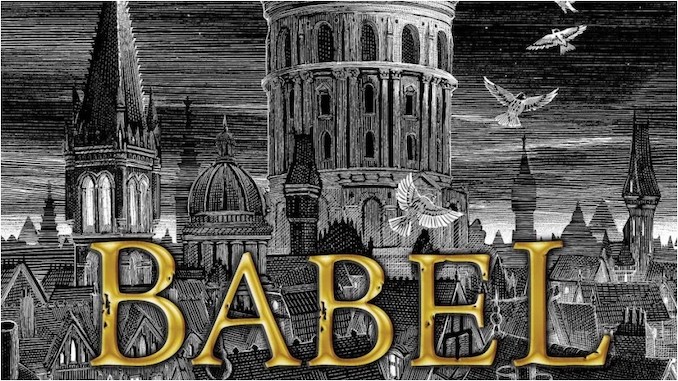Babel Is an Ambitious Epic That Doesn’t Trust Its Audience Enough

When done right, good fantasy transports us to a different place, introducing characters and realms we’d never have believed possible. But great fantasy should also make us reconsider the place we are as well, challenging us about our own beliefs or choices or offering us a new way of looking at the world we know. Author R.F. Kuang is no stranger to dark, difficult fantasy stories, as her epic (and excellent) The Poppy War trilogy more than proves. And she’s generally outdone herself with her latest effort, the dark academia standalone novel Babel, or the Necessity of Violence: an Arcane History of Oxford Translators’ Revolution.
A book that’s about the magic of language as much as it is literal magic, Babel is a tremendous effort—a meticulously researched period piece, a primal scream from the traditionally unheard, and a story of friendship gone horribly wrong. But its determination to make sure its (admittedly important) message is heard, means a significant chunk of this doorstopper’s 500+ pages feels didactic and lecture-y, rather than fully transformative.
The story follows Robin Swift, a young Chinese boy whose entire family succumbs to cholera in 1830s Canton. Taken away to England by Professor Richard Lovell (whose reasons for being in China are not explained until well into the novel), Robin is educated in Ancient Greek. Latin and Chinese—to maintain his fluency—in preparation for his future as an Oxford scholar, specifically as a student at the Royal Institute of Translation, colloquially known as Babel. A literal tower (because of course it is), this is the home of Britain’s most powerful magic, where silver bars are inscribed with words that allow them to perform all manner of specific tasks, that keep the country’s machines of industry and war running.
Most of this is unknown to Robin, who falls in love with the picturesque nature of Oxford, the higher calling of his studies, and the cohort of misfit friends who form his Babel class and found family: Charming Calcutta-born Ramiz Rafi Mirza, quiet Haitian-born Victoire Desgraves, and overachieving Letitia Price, an English girl from Brighton with a powerful admiral for a father. Together they must navigate the inevitable struggles of higher learning alongside their unique experiences as marginalized groups in a culture that doesn’t
The searing honesty with which Kuang depicts what life would have been like for non-white, non-native Oxford students is commendable—and frequently uncomfortable because this is not a book that pulls any punches when it comes to what the rich, white men who hold power in England think of those who are not like them. But as the scope of the story moves beyond Babel’s walls to issues of natural security and war, Robin and his friends must decide where their loyalties lie: With the school and system that is willing to open doors for them if they behave as model minorities, or with their homelands that are currently being exploited by England’s insatiable need for silver (and with it, power.)
-

-

-

-

-

-

-

-

-

-

-

-

-

-

-

-

-

-

-

-

-

-

-

-

-

-

-

-

-

-

-

-

-

-

-

-

-

-

-

-








































